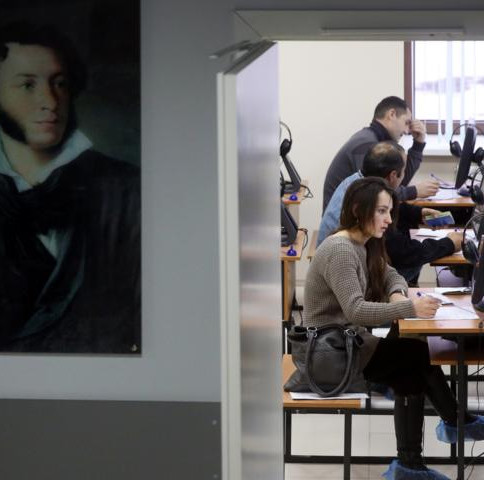September 4 witnessed the fifth Eastern Economic Forum (EEF 2019) open in Vladivostok. The forum's main program will last until September 6. This year the venue is attended by about five thousand participants from more than 50 countries. The key events are being held at the campus of the Far Eastern Federal University (FEFU) in the Russky Island area. The present forum's slogan is "The Far East - Development Horizons". This year among the honorary guests of the forum there are Prime Ministers of India, Malaysia and Japan Narendra Modi, Mahathir Mohamad and Shinzo Abe respectively, as well as President of Mongolia Khaltmaagiin Battulga.
The first day of the EEF 2019 has already been dubbed "Indian". And there is a good reason for that – on the sidelines of the forum there have been talks between Russian President Vladimir Putin and Indian Prime Minister Narendra Modi. The Indian Prime Minister is considered the number-one guest of the forum this year, thereby the Russian-Indian Vladivostok summit has become one of the central events of the EEF 2019.
The leaders of Russia and India spent most of the day together. Putin and Modi met at the FEFU wharf and took out on a boat to the Zvezda shipbuilding and engineering complex in the town of Bolshoy Kamen. There they got acquainted with the progress of modernizing the enterprise and constructing a dry dock to repair ships of all sizes. In the follow-up, negotiations were held, 15 documents were signed and a joint statement was issued. Putin and Modi also delivered their press statements after the talks. It is no coincidence that such a busy day inspired Narendra Modi to write a Russian-language post on his Twitter, referring to the EEF summit with Vladimir Putin as a landmark event.
"The summit with President Putin is a landmark event in the history of a landmark friendship! I am happy to have taken part in the 20th annual Indian-Russian summit," the Indian Prime Minister wrote. "President Putin and I considered the entire spectrum of Indian-Russian relations during a detailed discussion. Our talks will perk up bilateral ties."
It is worth noting here that during negotiations in an extended format Modi thanked Putin for awarding him the Order of St. Andrew — Russia's highest state award. "I am grateful to you and the people of Russia for this award. The order I was awarded demonstrates a special friendly relationship between the peoples of our countries. And it's a huge honor for the more than a billion people of India," Modi said.
However, let us dwell a little more on Russian-Indian relations in light of the talks between Putin and Modi on the sidelines of the EEF 2019. Following the summit, the Russian leader described India as a strategic and key partner, calling Modi as a "big friend" of Russia. "Relations between our countries can be described as truly strategic and privileged and have been developing on the basis of friendship and mutual benefit. Mr. Modi and I maintain close official and personal ties," Putin said. At the same time, the Russian leader stressed that their talks "are invariably conducted in a friendly atmosphere" and spoke of the issues the two leaders had touched upon during the meeting.
Indeed, Putin and Modi have had plenty to talk about. So, there is a similarity of attitudes taken by Moscow and New Delhi as regards the key international issues and major global and regional problems. It must be taken into account that Russia and India are carrying out foreign policy coordination under the leading multilateral formats. In particular, the UN, G20, the Shanghai Cooperation Organization (SCO) and BRICS. Negotiations on an agreement to establish a free trade zone between India and the Eurasian Economic Union (EEU) have begun. Moscow and New Delhi successfully collaborate on security and stability in Asia and the Indo-Pacific region (IPR). Besides, cooperation is developing in the RIC format (Russia, India, China) — the latest trilateral meeting was held on June 28 in Osaka as part of the G20 summit.
It is critical to underscore that Russia and India have the same view of the modern world. For instance, the leaders of both countries consider it impossible to achieve stability in international relations without building a multipolar world. Putin and Modi are sure that a multipolar world will guarantee stability across the globe. Moreover, both leaders oppose any external interference in the domestic affairs of other countries, which is especially important today given that Western countries, primarily the United States, often violate international law and interfere in others' internal affairs.
Trade and economic relations between the two countries are successfully developing, with military-technical cooperation being the driving force. Thus, Russia and India plan to bring the volume of mutual trade turnover up to $30 billion by 2025 and intend to keep working on the introduction of settlements in national currencies. To this end, Putin and Modi agreed to "to more actively engage the impressive resource and human resources potential of India and Russia, enhance industrial cooperation, create new technological and investment partnership, especially in advanced high-tech areas and find new avenues and forms of cooperation." It is not surprising in this regard that the parties agreed to intensify Russian-Indian collaboration in such areas as defense, nuclear energy, business and space.
Finally, speaking to journalists after his discussion with Modi, Vladimir Putin said that the Prime Minister of India had accepted an invitation to visit Russia next year and take part in the celebrations marking the 75th anniversary of Victory in the Great Patriotic War. A little earlier it became known that Narendra Modi had invited Vladimir Putin to visit India in 2020 and participate in the 21st annual Russian-Indian summit.









